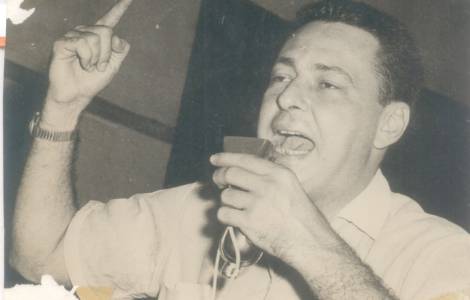
La Prensa
Managua (Agenzia Fides) - "We all remember Pedro Joaquín Chamorro as someone close and concerned about others, especially the poorest and those who suffer most. He also risked many times in order to allow Nicaraguans to live better, in a democratic, just and free society. Pedro Joaquín knew how to live and suffer for others. A profoundly Christian attitude that should not surprise us, because it is no secret to anyone that at the base of his social conscience and of his professional and political commitment there is his Christian formation and his relationship with the Church and his social doctrine. A Christian is passionate about life, even capable of risking his own so that others may have life, he is someone who brings relief, compassion and hope wherever he goes. A Christian radiates joy, spreads freedom, creates and dreams a new world". With these words, the Auxiliary Bishop of Managua, Mgr. Silvio José Baez, recalled Pedro Joaquín Chamorro, during the Eucharistic celebration for the 40th anniversary of his assassination last night. He was killed on January 10, 1978.
Pedro Joaquín Chamorro Cardenal (1924-1978) was a Nicaraguan journalist, publisher and politician who opposed the government of Luis Somoza Debayle and the dictatorship of Anastasio Somoza Debayle.
He was the editor of La Prensa newspaper. Since 2012 he has been officially declared Nicaraguan National Hero, with the title of "Martyr of public freedom", through a legislative decree of the National Assembly of Nicaragua. Since the day of his murder he was already honored as a martyr by the Nicaraguan people, without ideological or political distinctions. His widow, Violeta Barrios de Chamorro, was president of Nicaragua from 1990 to 1996.
"Today, forty years ago, his death moved the foundations of our country. His life was taken away, but he left a history and a legacy of admirable integrity, rooted in permanent human and Christian values, such as human dignity, social justice and freedom, values lived by him through a tenacious citizen commitment to help build a country that fought and continues to struggle to 'return to being a republic', as he himself said. A man and Christian. Father and husband. Friend and citizen. Exceptional lawyer and journalist. Honest politician. Victim of the irrational force of violence. National hero, today we remember him in the heart of the Risen in the communion of the Church", the Bishop continued in his homily.
"In the Gospel we heard tonight, we saw that Jesus did not know indifference, but he was attracted by the sufferings of others and did not hesitate to come closer to bring hope and relief. On leaving the synagogue he entered the house of Simon. Simon's mother-in-law lay sick. He approached, grasped her hand, and helped her up. (Mk 1: 29-31). Grasping her hand is a gesture of closeness and support that wants to pass on new strength. Jesus is the hand that God tends to all men who need strength, support, companionship and protection. This is the experience of believers throughout life. Supported by the hand of Jesus, they tend their hands to others.
What is lacking are fraternal hands engaged in love, hands that encourage, support and guide others! There are already enough hands that accumulate selfishly, that exclude or that mistreat and kill with impunity. We need hands that stretch out to share, sincere hands that promote friendly relations, hands that instil trust, sincerely stretched to welcome those who think different and full of charity to help the poorest and those who suffer most", commented Mgr. Baez referring to the passage of the Gospel.
"The life and thought of Pedro Joaquín Chamorro are a point of reference and a necessary inspiring ideal for a new generation of Nicaraguan citizens who must lead the country towards a mature, participatory democracy, without the defects of corruption, ideological colonization, autocratic claims and low-level demagogy: a new generation of Nicaraguans who overcome indifference and fear and strive to build a society founded on social justice and freedom, responsible use of the goods of creation and sustainable development, in fraternity, social inclusion and ideological plurality", concluded Mgr. Baez. (CE) (Agenzia Fides, 11/01/2018)